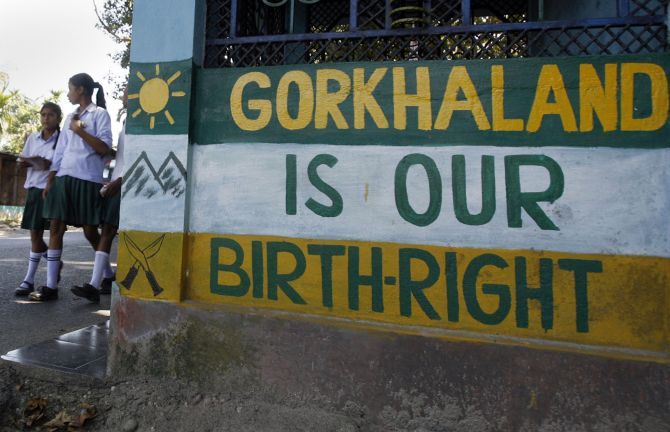 | « Back to article | Print this article |
Unrest in the hills has cost the tea sector its entire second flush and Rs 200 crore of its annual earnings.
Avishek Rakshit reports.

Darjeeling, best known for tea gardens and tourism in the Himalayan foothills, is estimated to have taken a hit of at least Rs 400 crore (Rs 4 billion) already due to more than 50 days of the Gorkhaland unrest and continuous shutdown.
The losses could deepen further, according to people in the know both in the state government and businesses.
Around 80 per cent of the population in Darjeeling, a picturesque West Bengal town in the backdrop of Mount Kanchenjunga, depends largely on the business of tea and tourism.
The two sectors make up for more than 90 per cent of the region's earnings.
The tea sector has so far lost its entire second flush, a term commonly used for the harvest in June that produces amber coloured and muscatel-flavoured Darjeeling tea.
Back of the envelope calculations suggest a loss of Rs 200 crore (Rs 2 billion) in second flush out of an annual earning of Rs 500 crore (Rs 5 billion).
Revenues from future harvests are at risk too.
"There has been a direct impact of Rs 200 crore on the tea sector. But even when production commences, it will take time to prune the bushes and the quality will suffer," Binod Mohan, chairman of the Darjeeling Tea Association, said.
Revenue and average price realisations from tea here is determined by its quality.
Globally, Darjeeling tea is the most sought after due to its uniqueness and production in limited quantity -- around 8 million kg every year.
Since June 9 this year, 87 gardens in Darjeeling have remained closed due to the Gorkhaland agitation.
As many as 25 trade unions in the area had called for a strike to implement the minimum wage programme which the Gorkhaland Janmukti Morcha, the largest party in Darjeeling hills, supported.
As tensions escalated in the region, the GJM called for an indefinite strike and the tea estates could not reopen.
Around 1.6 million kg of tea, accounting for 20 per cent of the annual production, has been lost since June 9.
The Darjeeling Tea Association recently approached the Tea Board for help to reopen the gardens and seek monetary compensation for the loss.
But garden workers are increasingly looking at Gorkhaland as a priority.
"Now, it is most important for us to get Gorkhaland. Until it happens, we will continue with the agitation and gardens will remain closed," a tea worker taking part in the agitation said.
As a result, garden owners are banking on the Tea Board of India to come to their aid.
The other lifeline in Darjeeling -- the tourism and hospitality sector -- which makes at least Rs 1,000 crore (Rs 10 billion) annually from visitors to the Darjeeling-Kalimpong-Gangtok belt is also under severe stress.
Samrat Sanyal, secretary of East Himalaya Travel and Tour Operators Association, said the tourism sector has lost around Rs 200 crore since June and that the figure may rise.
"The forthcoming holiday season during September-January will take a major hit. Even if the situation eases in the hills, tourists will be reluctant to visit these places for a holiday," he said.
In the September to January season, the region could take a hit of around Rs 600 crore (Rs 6 billion) due to loss of tourism business.
Already, there has been an impact on tourist flows to Sikkim as well.
The north-east town has lost 80 per cent of the season's tourist arrivals owing to the political unrest.
The Sikkim government plans to sue West Bengal in India's apex court, claiming Rs 60,000 crore (Rs 600 billion) damages due to the Gorkhaland agitation which has affected its economy.
GJM leaders, who have given a 10 day ultimatum to the Centre to decide on the Gorkhaland demand, believe that although the shutdown affects the economy in the region, it would create pressure on the government because of a drop in tax collection.
Commercial tax collection from Darjeeling district is pegged at around Rs 570 crore (Rs 5.7 billion).